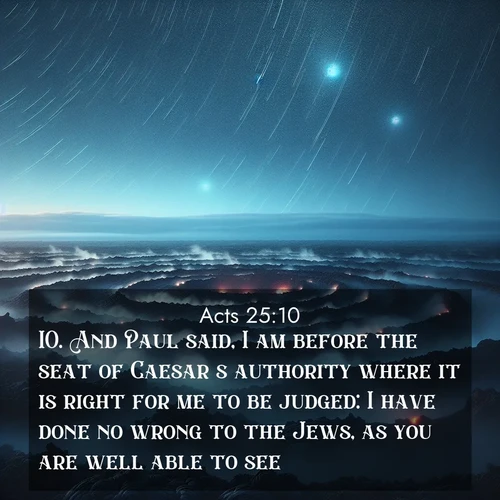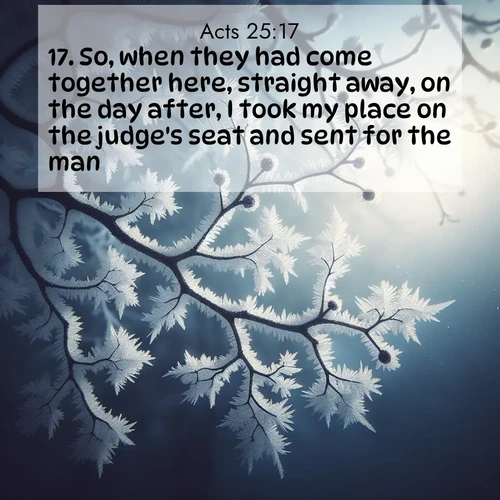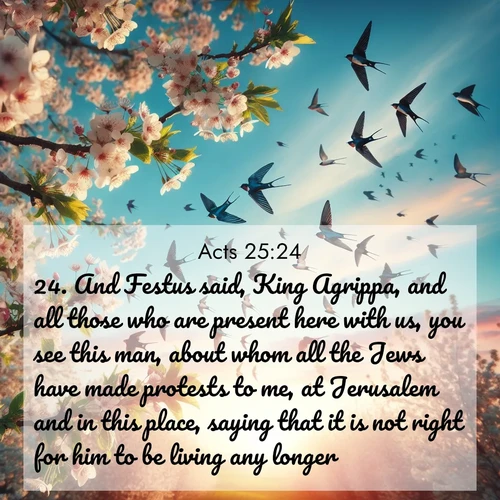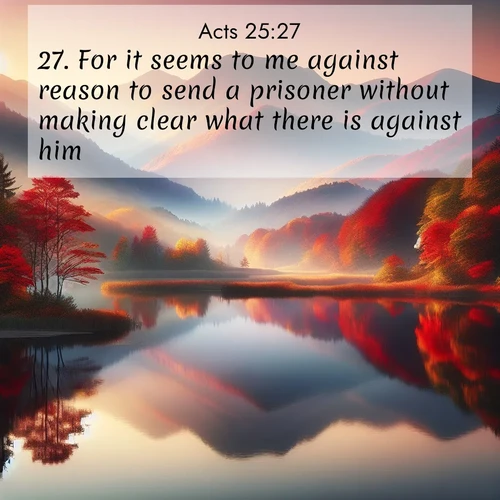Inspirational Bible Images for Acts Chapter 25 from Basic English
Acts 25:1. So Festus, having come into that part of the country which was under his rule, after three days went up to Jerusalem from Caesarea.
Read the verse in its context:
Basic English Acts 25
Acts 25:2. And the chief priests and the chief men of the Jews made statements against Paul,
Read the verse in its context:
Basic English Acts 25
Acts 25:3. Requesting Festus to give effect to their design against him, and send him to Jerusalem, when they would be waiting to put him to death on the way.
Read the verse in its context:
Basic English Acts 25
Acts 25:4. But Festus, in answer, said that Paul was being kept in prison at Caesarea, and that in a short time he himself was going there.
Read the verse in its context:
Basic English Acts 25
Acts 25:5. So, he said, let those who have authority among you go with me, and if there is any wrong in the man, let them make a statement against him.
Read the verse in its context:
Basic English Acts 25
Acts 25:6. And when he had been with them not more than eight or ten days, he went down to Caesarea; and on the day after, he took his place on the judge's seat, and sent for Paul.
Read the verse in its context:
Basic English Acts 25
Acts 25:7. And when he came, the Jews who had come down from Jerusalem came round him, and made all sorts of serious statements against him, which were not supported by the facts.
Read the verse in its context:
Basic English Acts 25
Acts 25:8. Then Paul, in his answer to them, said, I have done no wrong against the law of the Jews, or against the Temple, or against Caesar.
Read the verse in its context:
Basic English Acts 25
Acts 25:9. But Festus, desiring to get the approval of the Jews, said to Paul, Will you go up to Jerusalem, and be judged before me there in connection with these things?
Read the verse in its context:
Basic English Acts 25
Acts 25:10. And Paul said, I am before the seat of Caesar's authority where it is right for me to be judged: I have done no wrong to the Jews, as you are well able to see.
Read the verse in its context:
Basic English Acts 25
Acts 25:11. If, then, I am a wrongdoer and there is a cause of death in me, I am ready for death: if it is not as they say against me, no man may give me up to them. Let my cause come before Caesar.
Read the verse in its context:
Basic English Acts 25
Acts 25:12. Then Festus, having had a discussion with the Jews, made answer, You have said, Let my cause come before Caesar; to Caesar you will go.
Read the verse in its context:
Basic English Acts 25
Acts 25:13. Now when some days had gone by, King Agrippa and Bernice came to Caesarea and went to see Festus.
Read the verse in its context:
Basic English Acts 25
Acts 25:14. And as they were there for some days, Festus gave them Paul's story, saying, There is a certain man here who was put in prison by Felix:
Read the verse in its context:
Basic English Acts 25
Acts 25:15. Against whom the chief priests and the rulers of the Jews made a statement when I was at Jerusalem, requesting me to give a decision against him.
Read the verse in its context:
Basic English Acts 25
Acts 25:16. To whom I gave answer that it is not the Roman way to give a man up, till he has been face to face with those who are attacking him, and has had a chance to give an answer to the statements made against him.
Read the verse in its context:
Basic English Acts 25
Acts 25:17. So, when they had come together here, straight away, on the day after, I took my place on the judge's seat and sent for the man.
Read the verse in its context:
Basic English Acts 25
Acts 25:18. But when they got up they said nothing about such crimes as I had in mind:
Read the verse in its context:
Basic English Acts 25
Acts 25:19. But had certain questions against him in connection with their religion, and about one Jesus, now dead, who, Paul said, was living.
Read the verse in its context:
Basic English Acts 25
Acts 25:20. And as I had not enough knowledge for the discussion of these things, I made the suggestion to him to go to Jerusalem and be judged there.
Read the verse in its context:
Basic English Acts 25
Acts 25:21. But when Paul made a request that he might be judged by Caesar, I gave orders for him to be kept till I might send him to Caesar.
Read the verse in its context:
Basic English Acts 25
Acts 25:22. And Agrippa said to Festus, I have a desire to give the man a hearing myself. Tomorrow, he said, you may give him a hearing.
Read the verse in its context:
Basic English Acts 25
Acts 25:23. So on the day after, when Agrippa and Bernice in great glory had come into the public place of hearing, with the chief of the army and the chief men of the town, at the order of Festus, Paul was sent for.
Read the verse in its context:
Basic English Acts 25
Acts 25:24. And Festus said, King Agrippa, and all those who are present here with us, you see this man, about whom all the Jews have made protests to me, at Jerusalem and in this place, saying that it is not right for him to be living any longer.
Read the verse in its context:
Basic English Acts 25
Acts 25:25. But, in my opinion, there is no cause of death in him, and as he himself has made a request to be judged by Caesar, I have said that I would send him.
Read the verse in its context:
Basic English Acts 25
Acts 25:26. But I have no certain account of him to send to Caesar. So I have sent for him to come before you, and specially before you, King Agrippa, so that after the business has been gone into, I may have something to put in writing.
Read the verse in its context:
Basic English Acts 25
Acts 25:27. For it seems to me against reason to send a prisoner without making clear what there is against him.
Read the verse in its context:
Basic English Acts 25
The images of Bible verses are created starting from the verses in the Basic English Bible and are made vailable freely for download and use. A link to our website is appreciated to let others know about this free image library. The Bible in Basic English was created in the 1940s by S.H. Hooke, an English language scholar. He wanted to make the Bible accessible to people with limited English, those learning it as a second language, and those with low literacy. To achieve this, he used a simplified vocabulary of just 850 common words, with minimal grammar. This made the text easier to understand, though some argue it loses some of the poetry and nuance of the original. Despite this, it has been praised for its clarity and continues to be used today by many, particularly in education and evangelism. Lausanne AB church is pleased to freely provide the images.
NOTE: the images are free to use and share. Please include a link to our site to help others find this resource.



























